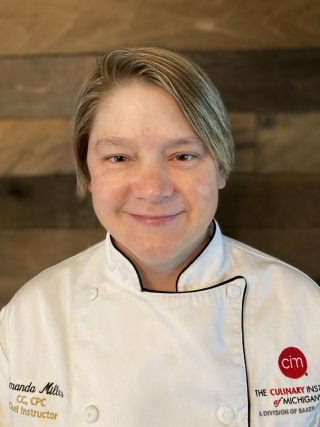
Building a Rapport with Students
30 April 2021Building trust and gaining respect by actions such as helping in the dish pit and asking for preferred pronouns. It’s leading by example and leading from the front.
By Amanda N. Miller, CC, CPC
If COVID-19 has taught us anything, it is patience and understanding. As culinary educators, patience and understanding are two of the most important traits we can possess while interacting with our students. Student retention is of the utmost importance with the pandemic making higher education more challenging to pursue with many protocols and restrictions in place. One way to increase student retention is to build a rapport with your students and in turn, you gain their trust as not just an instructor but as an approachable human being.
I am constantly reminded of my experience in culinary school and use those experiences to guide my leadership/instructional style. During my time in culinary school, I had some of the best experiences because of the instructors who influenced those experiences. I want the same for my students but I have to build a relationship and gain their trust before they “follow me into battle.” I also use my negative experiences from culinary school as behaviors to avoid while interacting with my students. It is the simple philosophy of treating someone as you would want to be treated.
In 2021, diversity and inclusion are at the forefront of conversations and are also included in discussions about how to build a rapport with students. It starts with respect and inclusion. Respect to me has to be earned from your students in the way we expect to receive respect from the students. It is a two-way street.
Building respect starts on day one by learning students’ names and pronouncing them properly. I recently approached a student whose name I knew but she did not know I knew it. Just by calling her name and pronouncing it right, she was excited to talk to me and engaged in what I had to say and vice versa. Ask students what pronouns they prefer. As culinary educators, students view us in positions of authority and have their guard up around us. By asking what their preferred pronouns are and sharing ours with them, students may become more comfortable with us and thereby take down their guard. A simple gesture like this can help them see you are in fact a regular person just like them. Take it even further and ask if they have a name/nickname they prefer to be identified by. Again, this will help the student feel more comfortable.
One of the first things I naturally do to gain trust is lead by example and lead from the front. I would never ask students to do something I would not do myself. The easiest example I can give for this is I jump in the dish pit with them and help them do dishes. This simple gesture shows I am approachable and accessible to them but most importantly that I am not above them. The dish pit is the area where I have had some of the best conversations. Take the time during these informal interactions to get to know your students. Find out what they like to do in their spare time, what their hobbies are, hidden talents, what their favorite food is, or most importantly what their favorite thing is to cook. It costs you nothing but can mean everything to them.
Another important key to building a rapport with students is by being passionate about the subject matter you are teaching. The enthusiasm and passion you exude about culinary or baking & pastry arts will rub off on them. The result will be a more engaged student who will actually want to be an active participant in the activity. Connect the subject to real-life experiences the student can relate to so they can hear your voice in their head when they are out in the real world. This will help foster a lasting impression they carry with them throughout their culinary industry career. It creates a “What would Chef Miller do?” kind of situation and they will remember the lessons I taught them.
Overall, when building a rapport with students it is important to be humble, respectful, and listen to what they have to say. Treat them in the same light as you would a friend or family member. Do not be afraid to be vulnerable or self-deprecating around them as well. Show them you make mistakes too and how you own up to those mistakes. It only helps students see you as approachable and as someone who they can respect and admire. They deserve your respect just as much as you expect theirs’. But remember respect must be earned. As a culinary educator, you can earn that respect by building a good rapport with each and every one of your students. They will then take what they have learned from you including the interpersonal skills and be better chefs in the industry.
Amanda N. Miller, CC, CPC, is a culinary arts/baking & pastry arts Instructor at the Culinary Institute of Michigan – Muskegon, which is a Division of Baker College. She is also the winner of the 2020 Postsecondary of the Year award sponsored by CAFÉ and the Sysco Corporation.
